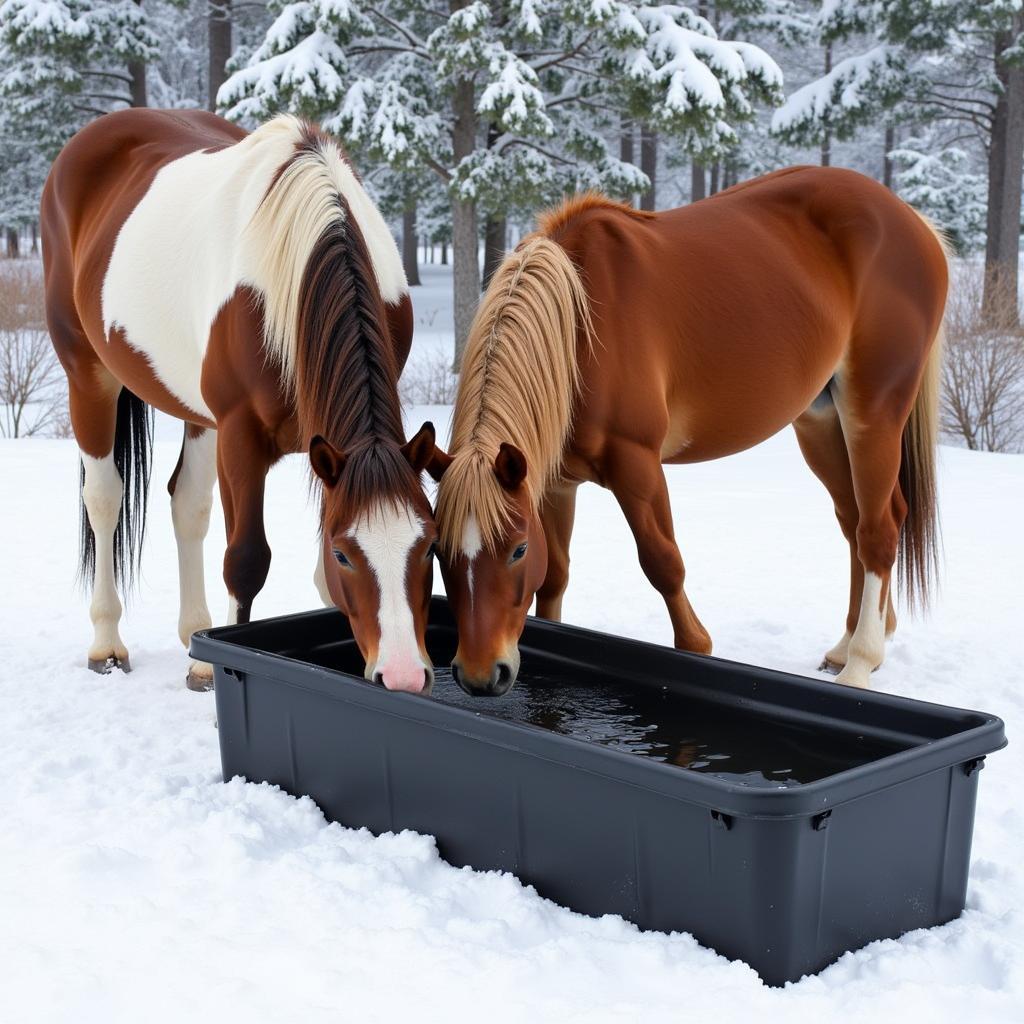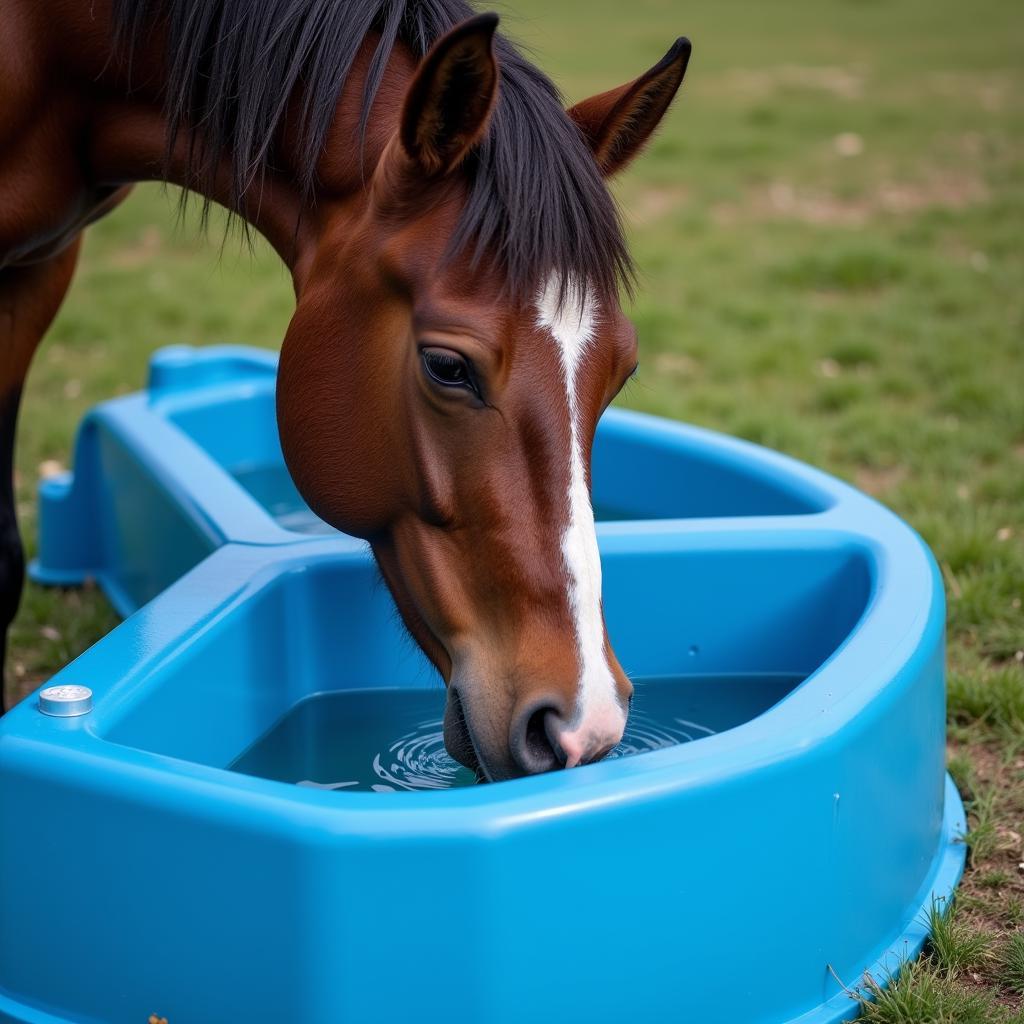Insulated water troughs are a must-have for horse owners in colder climates. They prevent water from freezing, ensuring your equine companions have access to this vital resource year-round. But with so many options available, choosing the right insulated trough can feel overwhelming. Let’s break down everything you need to know about Insulated Water Troughs For Horses, from their benefits to key features and expert tips.
Why Choose Insulated Water Troughs?
Horses need a surprising amount of water daily, especially during the winter months. When temperatures plummet, a regular water trough can quickly turn into a block of ice, leaving your horses thirsty and at risk of dehydration. Insulated troughs eliminate this worry by:
- Preventing Water from Freezing: The primary function of an insulated water trough is to keep water liquid even in sub-zero temperatures.
- Maintaining Water Temperature: Insulation helps regulate water temperature, keeping it cool in the summer and preventing rapid freezing in winter.
- Reducing Water Waste: No more chopping ice or constantly refilling frozen troughs, saving you time and effort.
- Promoting Horse Health: Consistent access to water is crucial for a horse’s digestion, circulation, and overall well-being.
 Horses drinking from an insulated water trough in the snow
Horses drinking from an insulated water trough in the snow
Types of Insulated Water Troughs
Understanding the different types of insulated water troughs can help you make an informed decision for your horses:
1. Heated Water Troughs: These troughs use electricity to keep the water at a consistent temperature above freezing. They are highly effective in extremely cold climates but require access to a power source.
2. Thermostatic Controlled Troughs: These troughs are similar to heated troughs but come equipped with a thermostat, allowing you to set the desired water temperature and conserve energy.
3. Insulated Concrete Troughs: These heavy-duty troughs provide excellent insulation and durability. They are a long-term investment and require less maintenance than other types.
4. Insulated Poly Troughs: Made from high-density polyethylene, these troughs are lightweight, portable, and resistant to cracking and rust.
 A bay horse drinking from an insulated poly water trough
A bay horse drinking from an insulated poly water trough
Key Features to Consider
When selecting an insulated water trough, keep these factors in mind:
- Size and Capacity: Choose a trough that accommodates the number of horses in your pasture and their water needs.
- Insulation Material: Look for troughs with thick, high-quality insulation like polyurethane foam or expanded polystyrene.
- Durability and Construction: Opt for sturdy materials like polyethylene, concrete, or stainless steel that can withstand harsh weather conditions.
- Ease of Cleaning: Regularly cleaning your horse’s water trough is crucial. Choose a trough with smooth, rounded edges and a drain plug for easy cleaning.
- Additional Features: Some troughs offer features like heated buckets, automatic waterers, or built-in float valves for added convenience.
Expert Tips for Using Insulated Water Troughs
- Location, Location, Location: Place your trough in a well-drained area to prevent mud and ice buildup around it.
- Check Water Levels Regularly: Ensure the trough is filled with fresh water, especially during periods of extreme cold.
- Inspect for Damage: Regularly check for any cracks, leaks, or damage to the trough’s insulation or heating elements.
- Winterize Your Trough: Follow the manufacturer’s instructions for winterizing your trough to prevent freezing and damage.
“Proper hydration is paramount for equine health, especially during winter,” says Dr. Sarah Williams, a veterinarian specializing in equine care. “Insulated water troughs are a worthwhile investment for any horse owner looking to provide their animals with a reliable source of unfrozen water.”
Conclusion
Investing in insulated water troughs for your horses is a smart decision that ensures their well-being throughout the year. By understanding the different types, features, and maintenance tips, you can make an informed choice that keeps your horses happy, hydrated, and healthy all winter long.
FAQs
1. How do I know what size trough my horse needs?
A general rule is to provide 5-10 gallons of water per horse per day. Consider the number of horses in your pasture and their activity level.
2. Can I use an insulated water trough in the summer?
Yes, the insulation helps keep the water cooler during the summer months.
3. How do I clean an insulated water trough?
Empty the trough, scrub it with a mild detergent and rinse thoroughly. Avoid using harsh chemicals.
4. What should I do if my heated water trough stops working?
First, check the power source and ensure the trough is plugged in. If the problem persists, consult a qualified electrician or contact the manufacturer.
5. Are insulated water troughs worth the investment?
Absolutely. They provide numerous benefits, including preventing water from freezing, reducing water waste, and promoting horse health.
Do you need help choosing the right insulated water trough for your horses? Contact us at Phone Number: 0772127271, Email: [email protected] or visit our location at QGM2+WX2, Vị Trung, Vị Thuỷ, Hậu Giang, Việt Nam. Our team of experts is available 24/7 to assist you!